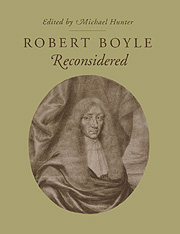Book contents
- Frontmatter
- Contents
- List of contributors
- List of abbreviations
- Preface
- 1 Introduction
- 2 Virtue, providence and political neutralism: Boyle and Interregnum politics
- 3 Science writing and writing science: Boyle and rhetorical theory
- 4 Learning from experience: Boyle's construction of an experimental philosophy
- 5 Carneades and the chemists: a study of The Sceptical Chymist and its impact on seventeenth-century chemistry
- 6 Boyle's alchemical pursuits
- 7 Boyle's debt to corpuscular alchemy
- 8 Boyle and cosmical qualities
- 9 The theological context of Boyle's Things above Reason
- 10 ‘Parcere nominibus’: Boyle, Hooke and the rhetorical interpretation of Descartes
- 11 Teleological reasoning in Boyle's Disquisition about Final Causes
- 12 Locke and Boyle on miracles and God's existence
- Bibliography of writings on Boyle published since 1940
- Index
5 - Carneades and the chemists: a study of The Sceptical Chymist and its impact on seventeenth-century chemistry
Published online by Cambridge University Press: 03 December 2009
- Frontmatter
- Contents
- List of contributors
- List of abbreviations
- Preface
- 1 Introduction
- 2 Virtue, providence and political neutralism: Boyle and Interregnum politics
- 3 Science writing and writing science: Boyle and rhetorical theory
- 4 Learning from experience: Boyle's construction of an experimental philosophy
- 5 Carneades and the chemists: a study of The Sceptical Chymist and its impact on seventeenth-century chemistry
- 6 Boyle's alchemical pursuits
- 7 Boyle's debt to corpuscular alchemy
- 8 Boyle and cosmical qualities
- 9 The theological context of Boyle's Things above Reason
- 10 ‘Parcere nominibus’: Boyle, Hooke and the rhetorical interpretation of Descartes
- 11 Teleological reasoning in Boyle's Disquisition about Final Causes
- 12 Locke and Boyle on miracles and God's existence
- Bibliography of writings on Boyle published since 1940
- Index
Summary
Like other works of Robert Boyle, The Sceptical Chymist had a long and difficult gestation. In February 1654 Hartlib referred to Boyle's writing a treatise ‘de Chemia et de Chymicis’. This was very likely the early version of The Sceptical Chymist to which Boyle referred in his ‘Author's preface’ of 1661:
It is now long since, that to gratify an ingenious gentleman, I set down some of the reasons, that kept me from fully acquiescing either in the peripatetical, or in the chymical doctrine of the material principles of mixed bodies.
The preface informs us that Boyle circulated the manuscript among ‘some learned men’, who received it favourably and prompted the author to ‘make it public’. A letter from Clodius answering Boyle's doubts about the nature of metalline mercuries leads us to infer that Boyle circulated the manuscript among members of the Hartlib Circle.
What is evidently a copy of this treatise, entitled ‘Reflexions on the experiments vulgarly alledged to evince the 4 peripatetique elements, or ye 3 chymicall principles of mixt bodies’, survives in Henry Oldenburg's commonplace book. It was published in 1954 by Marie Boas, who maintained that the treatise was written between 1651 and 1657. This dating has been questioned by Charles Webster, who suggested that analogies between Boyle's water culture experiments and those performed by Robert Sharrock in 1659 appeared to indicate that Boyle wrote his ‘Reflexions’ between 1659 and 1660.
- Type
- Chapter
- Information
- Robert Boyle Reconsidered , pp. 79 - 90Publisher: Cambridge University PressPrint publication year: 1994
- 5
- Cited by



